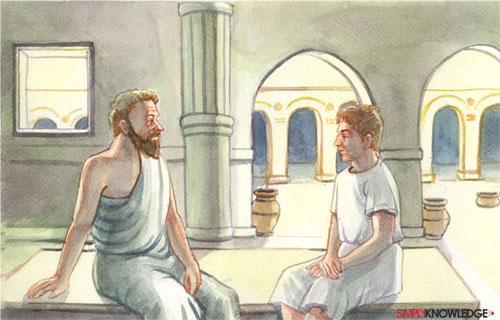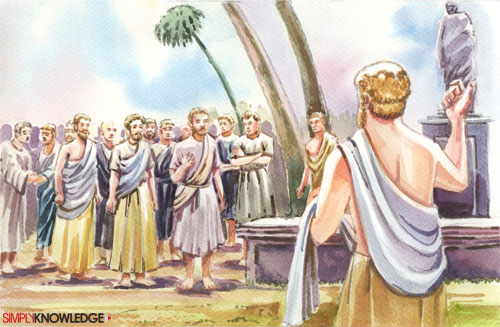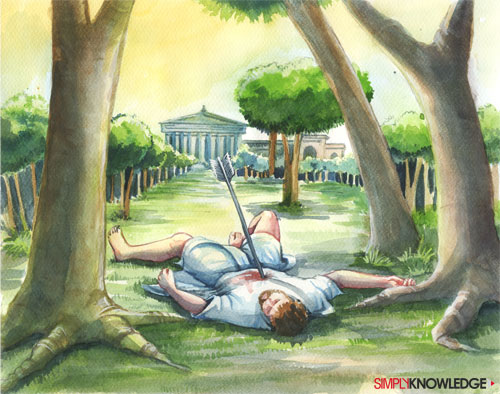


“Every person is his own archenemy,” said Anacharsis, one of the lesser known thinkers of ancient Greece. Despite Anacharsis’ achievements being lost to antiquity, he can be credited as being the first psychologist to have understood the problems of alcoholism and suggested moderation in consumption of the inebriating brew. In whatever primitive techniques that existed during the 6th Century BC, Anacharsis appears to have found how alcohol leads individuals from pleasure, causes addiction and eventually, a painful affliction. He propounded, wrong thoughts and actions of individuals culminate with disastrous results.
Some modern psychologists and thinkers credit Anacharsis as an early proponent of Cynicism though it is not known how he can be directly associated with the Cynic school of thought which rejected all societal norms while believing that absolute happiness arises from living in accordance with nature. A study into Anacharsis’ life reveals he was more concerned about the relevance of laws and traditions and their impact on people’s lives rather than abject rejection of accepted norms. He believed that every individual ought to live a life of moderation rather than excesses- regardless of whether they were the proletariat, bourgeoisie or aristocrats.

Anacharsis was born into the royal family of Scythia in or around 600BC. His father, Gnurus was a Scythian aristocrat while his mother, whose name is not known, was a Greek. Anacharsis’ uncle, Caduides was the king of Scythia.

It is evident that Anacharsis was well educated. Ancient chroniclers including Diogenes Laertius in his epic, ‘Lives and Works of Eminent Philosophers’, mentions Anacharsis as a thinker, who was interested in laws and judiciary. Hence, to study Grecian laws prevalent during his era, he travelled to Athens around 588BC, having heard of Solon, the great Athenian lawmaker, renowned for his legal psychology and formulating rules that abrogated the earlier, inhumane Draconian law penned in the blood of convicts by Draco.

Solon, one of the Seven Sages of ancient Greece, at the time was busy drafting humane laws for Athenians, which would benefit a majority of the local populace. The first meeting between Anacharsis and Solon was rather eventful. According to legend, Anacharsis, upon arrival in Athens, went to Solon’s residence to meet the great lawmaker.

Solon, not expecting a foreign guest, was irritated by Anacharsis’ unannounced arrival but came out to meet him. Anacharsis told Solon, he had travelled from Scythia by crossing the seas for the meeting. “I want to be your friend,” he said. This statement infuriated Solon since it was uncommon for foreigners to seek casual friendship with noble Athenians. The visibly annoyed Solon quipped, Anacharsis should make friends at home, rather than seek friendship in Athens, according to the prevalent Athenian traditions.
The quick witted Anacharsis replied that since Solon was at home, it was necessary for him to initiate the friendship between the two. The reply impressed Solon greatly who laughed at the young Anacharsis wit and wisdom and accepted his friendship- a relationship that lasted for several decades. Indeed, Solon was also overwhelmed by the fact that Anacharsis could converse in fluent Greek, despite being a Scythian, since he had mastered the language from his mother.

Being a quick learner who never concealed his displeasure at any wrongdoings and praised the good, Anacharsis soon became popular in ancient Athens. People from all walks of life considered him a sage of sorts. Indeed, he was tipped to be one of the Seven Sages of Greece along with his mentor and friend Solon, but Anacharsis did not consider himself worthy of the accolade and is said to have politely declined it. He was brutally candid in condemning the Athenian populace who were prone to accept any doctrine regardless of its consequences. “In Greece wise men speak and fools decide,” he said once, when asked how he perceived the Athenian society.
His reputation as a “sage” eventually gained him entry into the elite society translated as ‘The Family of Eleusinian Mysteries of the Great Ancient Goddess,’- believed to be a cult that worshipped an esoteric deity associated with knowledge and power. And the zenith of Anacharsis stay in Athens was, he was accorded Athenian citizenship, a privilege never offered to a foreigner.


With the great Athenian lawmaker Solon as his friend and mentor, Anacharsis began studying the new laws being formulated for Athens and compared them with Scythian ones. Consequently, he found several inherent flaws in the rules of his native land and resolved to amend them, believing they would be welcomed in Scythia. He also studied the Athenian lifestyle and was seemingly impressed by most of what he saw and learned, since their mores were based on human thoughts and their direct consequences on actions, which had seen Athens, grow to such a major power.

Armed with his newfound knowledge, Anacharsis returned to Scythia. Here, he extolled the virtues of Athenians, which were moderation and piety. He spoke about the simplicity of the Athenian citizens, regardless of their economic and social class and their insatiable quest for knowledge.
He started meeting Scythian aristocrats to discuss reforms in local laws and lifestyles of people and also with the populace to understand their views. However, his endeavours to reform Scythia were to remain unfulfilled forever.

Due to his increasing popularity among Scythians both, as a person and for his proposed reforms, Anacharsis had made several hidden enemies- one of them, his own cousin who was the successor to the Scythian throne.
This cousin, whose name remains unknown, looked for an opportunity to eliminate Anacharsis. One such an opportunity provided itself when the great thinker and his cousin were on a hunting trip. The cousin shot Anacharsis with a poisoned arrow. Though grievously injured, Anacharsis is claimed to have survived but only for a few days. He was shot with an arrow again on the lawns of the royal palace, by his cousin in or around 550BC.
His death so saddened the Athenians, they wrote a eulogy for him:
“When Anacharsis to his land returned,
His mind was turned, so that he wished to make
His countrymen all live in Grecian fashion.
So, before his words had well escaped his lips,
A winged arrow bore him to the Gods.”


Due to antiquity and enmity within his family, Anacharsis’ works are largely destroyed, especially the most important one comparing Athenian laws of Draco and Solon with those of his native Scythia.
From his surviving works, which are extant in the form of letters, it is evident that Anacharsis was opposed to unabashed consumption of alcohol. He defined liquor consumption by comparing the qualities of grapes saying: “A vine bears three clusters of grapes: the first wine which gives pleasure; the second causes drunkenness and the third, pain.”
He once told an inebriated youngster: “Young man, if now that you are young you cannot bear wine, when you are old you will have to bear water.”
His words are now proven scientifically that alcoholics first experience pleasure when they consume the first drink and as the quantity of this potent intoxicant increases, the drinker loses control and the third stage causes pain- or loss of control, social ostracism and other painful consequences.
Anacharsis also called upon Athenians and Scythians to exercise moderation in everything they do. “Restrain your tongues, your appetites, your passions,” he said- which is often inscribed on his surviving statues, since this was the main axiom of his teachings.
Prominent ancient historian and chronicler, Diogenes Laertius said: “Anacharsis marvelled that among the Greeks, those who were skilful in a thing vie in competition. Those who have no skill, judge"
Several other works attributed to Anacharsis were found to be fictitious and hence, discounted by ancient and modern thinkers.
Biography of Anacharsis | 0 Comments >>
0 --Comments
Leave Comment.
Your email address will not be published. Required fields are marked.

